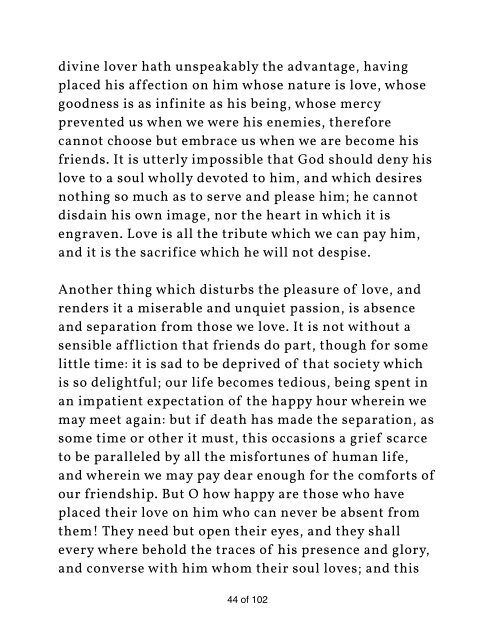The Life of God in the Soul of Man by Henry Scougal
The book instrumental in George Whitefield’s conversion The Life of God in the Soul of Man (1677), was originally written as a private letter to a ‘dear’ friend, to explain Christianity. It was never intended for publication. Yet it has become a classic Puritan text and one of the most read and influential treatises ever written for the comfort of God’s saints.
The book instrumental in George Whitefield’s conversion The Life of God in the Soul of Man (1677), was originally written as a private letter to a ‘dear’ friend, to explain Christianity. It was never intended for publication. Yet it has become a classic Puritan text and one of the most read and influential treatises ever written for the comfort of God’s saints.
Create successful ePaper yourself
Turn your PDF publications into a flip-book with our unique Google optimized e-Paper software.
div<strong>in</strong>e lover hath unspeakably <strong>the</strong> advantage, hav<strong>in</strong>g<br />
placed his affection on him whose nature is love, whose<br />
goodness is as <strong>in</strong>f<strong>in</strong>ite as his be<strong>in</strong>g, whose mercy<br />
prevented us when we were his enemies, <strong>the</strong>refore<br />
cannot choose but embrace us when we are become his<br />
friends. It is utterly impossible that <strong>God</strong> should deny his<br />
love to a soul wholly devoted to him, and which desires<br />
noth<strong>in</strong>g so much as to serve and please him; he cannot<br />
disda<strong>in</strong> his own image, nor <strong>the</strong> heart <strong>in</strong> which it is<br />
engraven. Love is all <strong>the</strong> tribute which we can pay him,<br />
and it is <strong>the</strong> sacrifice which he will not despise.<br />
Ano<strong>the</strong>r th<strong>in</strong>g which disturbs <strong>the</strong> pleasure <strong>of</strong> love, and<br />
renders it a miserable and unquiet passion, is absence<br />
and separation from those we love. It is not without a<br />
sensible affliction that friends do part, though for some<br />
little time: it is sad to be deprived <strong>of</strong> that society which<br />
is so delightful; our life becomes tedious, be<strong>in</strong>g spent <strong>in</strong><br />
an impatient expectation <strong>of</strong> <strong>the</strong> happy hour where<strong>in</strong> we<br />
may meet aga<strong>in</strong>: but if death has made <strong>the</strong> separation, as<br />
some time or o<strong>the</strong>r it must, this occasions a grief scarce<br />
to be paralleled <strong>by</strong> all <strong>the</strong> misfortunes <strong>of</strong> human life,<br />
and where<strong>in</strong> we may pay dear enough for <strong>the</strong> comforts <strong>of</strong><br />
our friendship. But O how happy are those who have<br />
placed <strong>the</strong>ir love on him who can never be absent from<br />
<strong>the</strong>m! <strong>The</strong>y need but open <strong>the</strong>ir eyes, and <strong>the</strong>y shall<br />
every where behold <strong>the</strong> traces <strong>of</strong> his presence and glory,<br />
and converse with him whom <strong>the</strong>ir soul loves; and this<br />
44 <strong>of</strong> 102

















